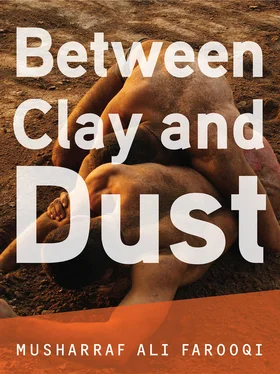“Ustad Ramzi…” Maulvi Yameen began.
“Take him away! Take him away! Tell them to take him away!” Ustad Ramzi shouted, turning toward Maulvi Yameen.
Maulvi Yameen said to Kabira, “Do not let this argument delay the burial.”
“Even animals respect death,” Kabira hissed. “Even animals know better.”
“All places are equal,” Maulvi Yameen said. “We can bury him in the municipal graveyard.”
“Yes. Bring him away.” Kabira wiped his eyes. “Bring him away, as God sees all. He will not respect the honor due to the dead,” he said pointing at Ustad Ramzi, “but we must not disgrace it. Pick him up. Pick him up now! We are leaving!”
Driven by the authority in Kabira’s voice the men in Kabira’s group stepped forward to lift Tamami’s bier.
Ustad Ramzi watched Kabira and his friends carry it away. All the members of his clan and the trainees who had come out from their quarters followed them. The enclosure grew darker as the men left, reciting prayers for the dead.
When the enclosure attendant, who was the last to leave to join the funeral procession, turned back to close the gate behind him he saw Ustad Ramzi standing rigid and unmoved in his place.
For Ustad Ramzi it was not just Tamami’s life that had ended. Tamami’s slide into degeneracy, which would have brought further disgrace and ruin to his clan, was finally over. So was Ustad Ramzi’s own exhausting journey through the pits of humiliation and shame.
When Ustad Ramzi had excommunicated Tamami, using his authority as the head of the clan, everyone followed his orders. The clan members felt that Tamami’s punishment was disproportionate to his actions, yet their own interests were tied to the clan. Ustad Ramzi’s actions gave them a sense of moral superiority that allowed them to feel outraged at his deed while maintaining an attitude of just indignation toward Tamami.
The side of human nature that takes delight in the spectacle of others’ misery had revealed itself in the comments the clan members and trainees made in passing even before Tamami’s death:
“It was too harsh to expel his own brother from the enclosure.”
“But Tamami had crossed all limits.”
“Still, he was his brother. Born of the same mother.”
“But Tamami had rolled his name and his family honor into the dust.”
After Tamami’s death, Ustad Ramzi had vowed to carry on as if nothing had changed. But when he stepped out of his quarters he felt hostile eyes following his movements.
The one who was dead had escaped condemnation. But the other was alive and was judged:
“Ustad Ramzi was heartless to deny the clan burial grounds to his own brother.”
“He first expelled his brother from his home and then denied him even a burial with his fathers.”
“Why should he expect those who are not his kin to show him any mercy?”
Ustad Ramzi heard these remarks and kept quiet. But now he had recurring dreams in which he saw his brother’s dead body lying without a winding sheet at his feet.
When Ustad Ramzi stepped out of the enclosure on the fourth day after Tamami’s death to visit Gohar Jan’s kotha, he felt nauseous. He kept wandering off the path and walked aimlessly in the adjoining alleys.
He had summoned all his fortitude to drive the thoughts of his brother out of his mind. But he did not succeed in quelling his conscience from which fragments of guilt broke out. An unresolved conflict now festered in his mind. He had tried to subdue the commotion in his soul and failed.
When he was the foremost pahalwan of his day, he had defended his elders’ titles until they retired. But it was also true that he never had any dearth of worthy competitors. Those were the times that produced great ustads and champions. A month never went by without a major bout or tourney. He had always had the incentive to remain in a state of constant physical preparedness and his grueling routine never tired him mentally.
But nobody came forward to fight Tamami after Imama’s death. There was no challenger in sight, but Tamami underwent a punishing regime of exercises day after day, week after week. If Ustad Ramzi had retired at that time, the Ustad-e-Zaman’s title would have brought some consolation to Tamami, who would have found in the gesture an acknowledgement of his struggle. But he could not bring himself to accept that Tamami was worthy of a title that he had held.
He had turned his brother into his personal slave, fighting the shadows of his own fears. His actions did not serve the art he professed to protect; they served only him. Tamami’s inability to protest his treatment must have driven him to despair.
Ustad Ramzi found himself not far from Gohar Jan’s kotha entrance. He craved some reprieve from his suffocating grief, and the darkness of the unlighted stairwell offered itself as a refuge to him.
Ustad Ramzi climbed up the stairwell and sat down midway.
He was sure Gohar Jan would have learned of Tamami’s death. Everyone in the inner city knew about it. Banday Ali, who usually came to inquire if he was absent without notice, had not visited him for three days. Ustad Ramzi’s presence at the kotha would oblige Gohar Jan to adhere to the usual routine of her recitals. He was not sure if he desired that.
Ustad Ramzi regretted having come there, and felt he would be sick.
As he rose to leave, he heard someone coming up the stairs.
“The bulb is fused again! What a nuisance!” he heard Banday Ali say.
“Who’s there?” Banday Ali asked hearing Ustad Ramzi’s footsteps on the staircase.
“It’s me!” Ustad Ramzi called out.
“I am coming up,” Banday Ali said.
He passed Ustad Ramzi on the way up and opened the door. The bulb in the veranda lit up part of the staircase too, but Ustad Ramzi did not move into the light. Banday Ali stepped over to one side.
“Come on inside. I will go and change the bulb,” he said.
Ustad Ramzi stepped inside.
Entering the Music Room, he found Gohar Jan by herself. The tanpura and the tablas were covered.
“Please sit down,” Gohar Jan said, motioning him to his regular place on the carpet.
Ustad Ramzi sat silently.
He felt cold. It was not yet September, but in the evenings the air had become crisp and dry. He felt thirsty.
“Can I have some water?” he asked.
Gohar Jan poured him some water from the ewer.
“I heard of your brother’s death,” she said, passing the bowl. “I am sorry.”
Ustad Ramzi gripped the bowl with both hands. But he saw she was not looking at him.
“I heard that you two were the last remaining of your family. One never forgets a childhood spent together.”
He stared at her. His pride and guilt put him on guard at her first words, but now his concentration wavered. Because of their significant age difference, he and Tamami had no shared childhood. It was also said about Ustad Ramzi that childhood never visited him. He had always been serious and somber.
“Sometimes it is a difficult thing,” Gohar Jan’s voice interrupted Ustad Ramzi’s thoughts, “To go through life carrying all the memories of your family, knowing that both the memories and family will end with you.”
Gohar Jan said something a moment later that Ustad Ramzi did not quite hear, but it registered sufficiently in his mind to attract his attention.
“…I could talk about it,” she said, “as I do not have many years left.”
Something more than the words caught Ustad Ramzi’s ear. It was the grief in Gohar Jan’s voice, so much at odds with her usual tone.
Then Ustad Ramzi’s attention wandered away. He could not tell how long his mind was blank. When he regained his attention, Gohar Jan was saying:
Читать дальше












